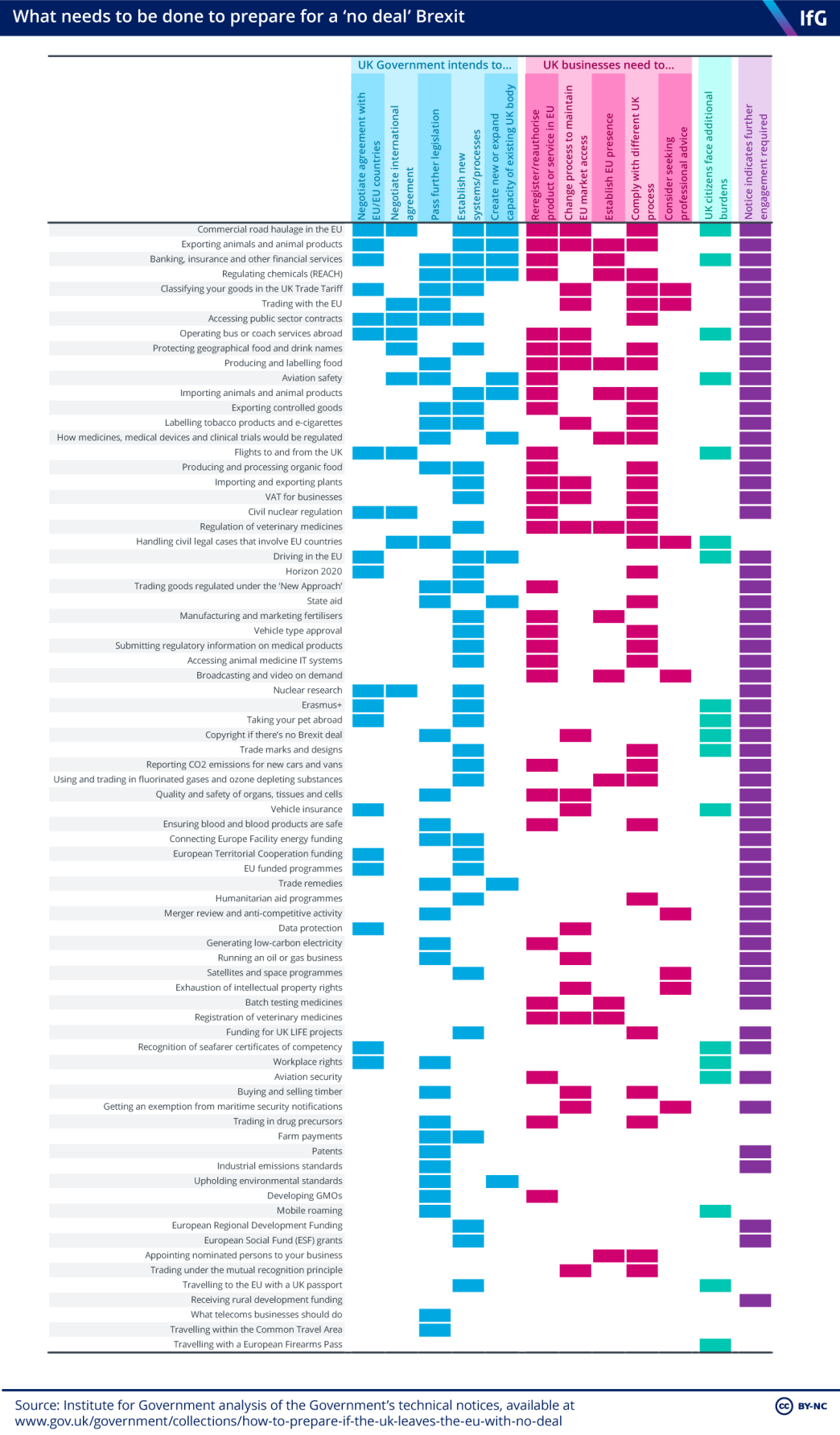The UK still isn’t ready for a no deal Brexit
There are still many outstanding issues the Government needs to address before the UK can be ready for a no deal Brexit.
Even with 76 ‘no deal notices’, Tim Durrant warns there are still many outstanding issues the Government needs to address before the UK can be ready for a no deal Brexit.
The Government has published a series of ‘technical notices’ setting out how it will respond to a no deal Brexit. We have analysed the 76 (so far) published notices and found that the biggest questions have still not been answered.
We still don’t know how the Government plans to guarantee the rights of EU citizens here, or how it will secure the rights of Brits living in EU countries. Other major gaps include how the authorities plan to manage the increased traffic around ports, particularly Dover, that will result from all the extra checks on goods. There is also no clarity on the UK’s access to trade agreements negotiated by the EU. And a big question mark remains over fisheries.
The Government has a lot to do – in Parliament and in the real world
As the graph below shows, nearly half of the 76 notices published so far refer to new legislation that is required before March next year. Some of this will be secondary legislation under the EU Withdrawal Act while other notices, such as the one on low-carbon electricity generation, are less clear. Either way, we know that there is still a lot of legislation to be passed in Parliament ahead of March next year.
Around 30 of the notices spell out a need for Government to carry out functions that are currently in the remit of an EU body. Many of these new processes will require a new IT system. For example, the UK will establish its own system of ‘geographical indicators’ for food and drink products. And at least two new bodies have already been planned – the Trade Remedies Authority and the environmental watchdog. The first has already started recruiting; but we know less about the second, and past experience shows that public bodies may take up to three years to set up.
But as big a task will be the expansion of existing capacity. Beyond the well-flagged issue of customs, the notices make clear that the Post Office will need to beef up how many of its offices provide International Driving Permits; the Driver and Vehicle Standards Agency (DVSA) will be facing a deluge of applications for haulage permits and trailer registrations; and the Competition and Markets Authority will begin enforcing the UK’s new domestic state aid regime.
Much of the burden – and risk – will fall on business
Similarly, about half of the Government’s notices suggest some form of action that businesses should take. But as Adam Marshall of the British Chambers of Commerce said recently, the notices "range from the crystal clear to the maddeningly obtuse".
Many of the notices recommend that businesses seek professional advice, from lawyers, customs experts or others. This will of course be costly, particularly for small firms. To ensure business continuity, some firms trading with the EU will have to make significant changes. For example, UK chemicals producers will have to re-register their products in a European Economic Area (EEA) country to continue accessing the EEA market. Similarly, UK airlines will have to get agreement from each member state to continue flying between them and the UK, as well as re-registering as non-member airlines with EASA, the EU’s aviation safety authority.
Many businesses will also face more red tape at home, as they deal with the new processes set up by different parts of the UK Government. One particularly onerous new bureaucratic process will be the need for customs declarations, to comply with the UK’s new status outside the EU’s customs union. HMRC estimate that there are between 145,000 and 250,000 small businesses who currently only export to other EU countries, who will have to adopt these processes for the first time.
The no deal notices expose asymmetry between the UK and the EU
What is also clear from the notices is just how different the approaches of the UK and the EU are to no deal. The EU has been clear that it will not recognise UK authorisations across a huge range of businesses. The UK, on the other hand, has said that it will continue to recognise EU standards in the vast majority of areas, meaning EU goods can continue to be imported into the UK.
This means that UK companies will not be able to sell into the EU unless they re-register their products or services there, while their EU competitors will continue to have full access to the UK. This may make logistical sense, to maintain imports into the UK and transport connections with neighbours, but the politics will not be easy.
Many of the notices say that further guidance is on its way. And we expect more notices to be published. But without clarity on these issues, and with so much left to do, it is hard to take seriously the Government’s claim that the UK is ready for no deal.
- Supporting document
- brexit-six-months-to-go-final-WEB.pdf (PDF, 564.7 KB)
- Topic
- Brexit
- Keywords
- Business
- Country (international)
- European Union
- Publisher
- Institute for Government
